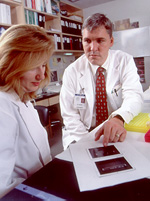 Dr.
David J. Cole and research assistant Lisa M. Sooy review a photograph of
molecular markers for tumor-associated genes detected by RT-PCR..
Dr.
David J. Cole and research assistant Lisa M. Sooy review a photograph of
molecular markers for tumor-associated genes detected by RT-PCR..
On July 1, an international research team launches a worldwide study of a molecular screening method that may uncover hidden breast cancer in lymph nodes of women undergoing mastectomy or lumpectomy for that disease.
Preliminary studies at MUSC have found breast cancer-associated markers presenting 40 percent of lymph node tissue determined to be free of cancer by standard pathological testing.
“The research will determine if these molecular markers are clinically relevant in predicting disease recurrence,” said David J. Cole, M.D., an MUSC surgical oncologist and principal investigator for the study.
“Identifying women in whom breast cancer most likely will recur helps the cancer treatment specialist determine whether or not to institute aggressive anti-cancer therapy.”
Supported by a $3.8 million grant from the Department of Defense, the project is entitled Minimally Invasive Molecular Staging of Breast Cancer Trial or MIMS trial. It is a collaborative effort among the Medical University's Department of Surgery, Hollings Cancer Center and Clinical Innovation Group.
“We are grateful for the assistance of U.S. Senator Ernest F. Hollings in supporting funding for this significant research project,” said James B. Edwards, DMD, MUSC president. “Senator Hollings has been a long-time advocate for cancer patients. His efforts on behalf of the Hollings Cancer Center have been invaluable in helping the center pursue its mission of patient care, prevention and control, research and education.”
The research team plans to study more than 1,130 women with breast cancer in 12 centers around the world for five years.
The women, who will undergo either mastectomy or lumpectomy, will have their lymph nodes tested by standard pathological means, and be given standard post-surgical treatment based on the results of their lymph node biopsies.
The women in the study will also have their lymph nodes examined by the new molecular test—the RT-PCR (reverse transcriptase-polymerase chain reaction) marker panel. After five years, the investigators will be able to determine if the RT-PCR panel screening method was more effective in predicting the recurrence of cancer than standard pathology testing.
In addition, researchers will look at the predictive potential of tissue taken from the sentinel lymph node (a less invasive procedure than dissection of all the lymph nodes) and tissues from bone marrow. If these secondary options prove to be just as effective in predicting cancer recurrence as the biopsy and screening of all lymph nodes, the researchers will have found a much less invasive and less expensive method of prediction.
The RT-PCR marker panel, designed by Cole's research group, signals the presence or absence of up to four markers that have been associated with breast cancer. When the probe finds any of the markers in RNA from lymph nodes taken from a woman who has had lumpectomy or mastectomy for breast cancer, “we would consider that evidence that the lymph node has at least some form of cancer cell that shouldn't be there,” Cole said.
The RT-PCR analysis amplifies gene products to the point where they can be detected in a highly sensitive manner, Cole explained.
“If you have one cancer cell in a million normal lymph node cells, the RT-PCR probe would be able to pick that up; that is on the level of 10 to 100 times more sensitive than routine pathology testing.”
In Cole's preliminary test, he found that a total of 37 women in a study of 61 consecutive patients who underwent lymph node dissection to determine the spread of cancer had lymph nodes that were considered to be negative by pathology. However 15 of these 37 (40 percent) exhibited evidence of cancer-associated gene products on RT-PCR analysis.
“The information gained from this trial has important implications for treatment,” said Rayna Kneuper Hall, M.D., an MUSC medical oncologist. “If these markers prove to be more accurate predictors of possible recurrence, it will help cancer physicians determine which patients definitely need aggressive chemotherapy treatment, and which patients may do well with milder treatment. It would help patients at higher risk receive the intensity of treatment they would need to decrease their risk of the breast cancer coming back, and it would spare women with a very low risk, the toxicities from aggressive treatment when they may do well with less intense chemotherapy.”
Twelve sites plan to participate in the trial. They are located in Victoria, Australia; London, England; Chicago; Philadelphia; Washington, D.C.; Greenville, S.C.; Spartanburg, S.C.; Charleston, S.C.; St. Louis Mo; Jacksonville, Fla.: Augusta, Ga. and Birmingham, Ala.
“The varying sites were selected to get a strong regional, national and international input,” said Cole. “We selected academic centers with surgical oncologists who were known to us and had the patient volume, interest in breast cancer, and capability to perform the surgery required. The institutions also needed to have the infrastructure to process the tissue, and have appropriate clinical follow-up of the patients.”